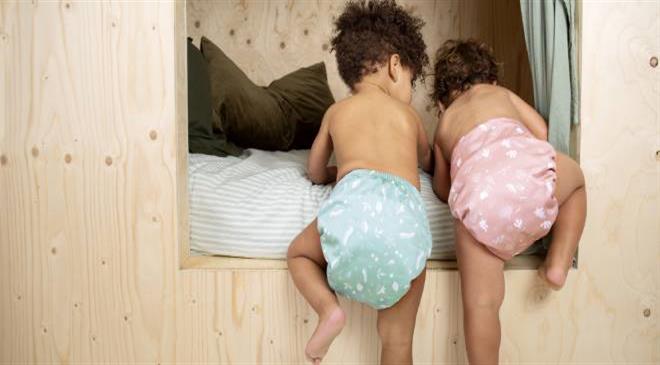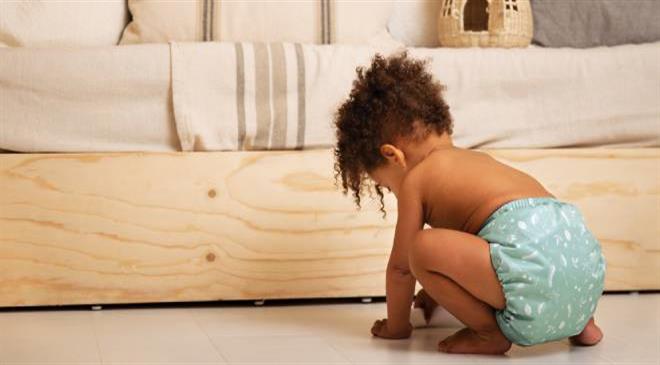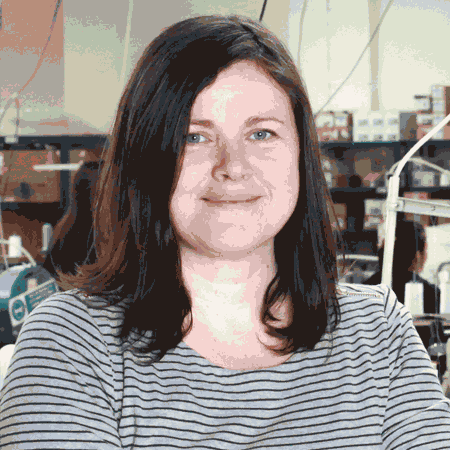On a mission to normalise reusable nappies
Founded in 2001 by husband-and-wife team Fiona and Magnus Smyth, TotsBots is an award winning manufacturer of reusable nappies and accessories based in Glasgow, Scotland. Fibre2Fashion interviewed the founders to find the story behind founding of the brand, the initial roadblocks they faced and how has acquisition of their business by ethical children’s clothing brand Frugi helped to further business.
How did you lay the groundwork for starting your own sustainable nappies brand TotsBots?
Having used disposable nappies with our first child, we understood the convenience but our concerns for the environment meant we didn’t want to go down that route again. Therefore, our daughter Maia was the tot who started it all!
When we couldn’t find a reusable brand on the market that we liked, we were determined not to give up on cloth. So, we bought 50 metres of toweling ourselves and created the very first TotsBots reusable nappy using a sewing machine at home. In 2001, our business and the TotsBots brand were built literally from the kitchen table up! From our original reusable nappy prototype 20 years ago, we have continued to develop our designs to be the best-selling styles we have in the range today.
Over the years TotsBots has grown steadily and was born right at the start of trading on the internet. We have had to keep abreast of technology moving from telephone ordering to full e-commerce and social media. Right from the start, we have had our own manufacturing facility. This is of course way more complicated than simply buying and selling finished garments from third party suppliers, especially when you have no manufacturing experience! The learning curve has been very steep, and we have invested heavily in our people to ensure our quality is the best and our processes are as efficient as possible.
In addition, we are constantly innovating, which has been key to the brand’s success. As an example, in 2003 we revolutionised the industry by developing the first ever reusable nappy made from bamboo fibre. This went on to be the first-ever reusable nappy to win the ‘Mother & Baby’ Gold Award and opened the flood gates for the use of this fibre in nappies globally.
What steps do you take to ensure that the raw materials used and even designs are child-friendly and eco-friendly? Does sustainability add into your pricing points?
We take many steps to ensure our materials and products are of the best quality. This involves extensive testing both in house and at third party specialist facilities. We are also constantly testing improvements to our garments with customers. Ultimately our aim is to ensure our nappies are soft and comfortable for babies, whilst offering high performance levels and being highly durable.
Sustainability is one of our top priorities and is the reason we started the business. By switching to reusables our customers are using a staggering 98 per cent less raw materials and emitting 40 per cent less CO2 than parents using disposables. Beyond that, we work exceptionally hard to reduce the impact our own operations have all the way through our supply chain. As an example, our waterproof fabric is made using 100 per cent recycled polyester, with 2 plastic bottles being diverted for each nappy made.
How do you retail the products online and offline?
TotsBots has a strong online presence, and a popular website that lists all our products from across our brand and where we ship directly from.
We also work with various stockists across the UK, including the Nappy Lady, who we have worked with since 2000, as well as Natural Baby Shower and Babipur. We try to partner with stockists who have a focus on ethical and sustainable clothing for children and are always on the lookout for more. TotsBots is also stocked in large retailers from the UK, including Next.
What were the initial hiccups you faced?
Aside from the usual business-related issues startups face, a key issue has always been the perceived difficulties that accompany the reusables market more generally. When looking at nappies specifically, reusables sometimes don’t appear as the desired option for some parents, compared to the ease associated with disposables. Research suggests that there is still a reluctance by some parents to buy into the ‘reusable nappy’ ethos due to the misconception that using reusables are time consuming, complicated and messy to use. The UK nappy market has a 90/10 split between disposable and reusable product demand, but the divide is becoming smaller, as more and more parents look to cut back on waste going to landfill and to save money in the long run. That’s why we are on a mission as a brand to normalise reusable nappies; to help parents find their reusable routine, and ultimately help protect our planet, one nappy change at a time.
What were the initial materials you experimented with, and which were found most suitable?
When we first started making nappies, we used cotton toweling, as we wanted to produce a high-quality product that was also sturdy, soft, and sustainable. Whilst toweling is not new, we sourced an innovative knit which was more durable and dried faster than traditional woven terry. In our opinion, toweling still offers the best balance between absorbency, drying time, comfort, and durability of any textile. As mentioned earlier, we were the first nappy brand to make our reusable nappies from super soft and squishy bamboo and also from toweling, By combining these two materials, we achieved the optimum performance balance in terms of softness, absorbency and drying time.
We have developed fabrics to be highly repellant to moisture which, alongside absorbency, is key to achieving the best performance in the core of a nappy.
Various waterproof materials (membranes etc) have been tested and trialed over the years for the outer layer of our nappy and we are always looking for the latest innovation. We now have a material that is super soft and stretchy, whilst being highly waterproof and durable to the intensive laundry that nappies are subjected to in their lifecycle.

Who are your competitors in the international market in your niche?
We have various competitors outside of the big disposable brands. However, the biggest issue in our niche is the greenwashing being deployed by so called 'eco disposable’ nappies. A recent study by ECOS found that these disposable nappies had the largest number of vaguest claims of any product category. These products are hoodwinking parents into thinking they are doing the right thing when they use similar levels of raw material and CO2 to produce as regular disposables. The products themselves are too complex to be recycled effectively and any claims of biodegradability are spurious at best as nothing breaks down in landfill/incinerators which is where these items end up. They are also the single biggest contaminant in domestic recycling in the UK, as parents are confused as to how they should be disposed of.
TotsBots reusable nappies are made with genuine thought about the planet, as well as caring about what parents put next to their baby’s skin.
What marketing strategies do you employ to stay ahead of the race?
What marketing strategies do you employ to stay ahead of the raceLast month, we announced that TotsBots is having its first significant brand refresh and receiving our first investment in marketing in 20 years to propel the brand within the rapidly growing reusable sector.
On our mission to make premium reusable nappies in the kindest way possible to our planet, we hope to inspire and enable more parents to make choices that have a positive environmental impact for the future of their children. We are celebrating this exciting re-brand with a new range of Nature’s Rainbow nappies in the same award-winning, planet-friendly products consumers have loved for over 20 years. TotsBots’ much-loved reusable ‘Bamboozle’ system has taken on a new muted colour palette with blue nightscapes, green foliage, pink coral, and yellow sunrises. This new look and feel brings freshness and energy to the range.

How big is your team now and what are your biggest achievements as a brand in the last 20 years?
In creating our business, we wanted to use it as an opportunity to create jobs in our local area. After all, we were unemployed for three years before we started TotsBots. Our factory is in a regeneration area of Glasgow, which offers employment to those who live nearby and is beneficial for the local economy. We hope to inspire other companies to also manufacture more locally, as it is beneficial to our local economies, with potentially lower environmental impacts. TotsBots currently has 74 employees in the team with the workload flowing across many departments within our parent company Frugi, whose team is based at the head office in Helston, Cornwall.
Our biggest achievement is seeing our brand grow from the kitchen table up into one of the leading reusable nappy companies in the UK. We are incredibly proud of our story and the awards we have won, including ten Mother & Baby Gold awards for best reusable nappy.
In 2020 we sold the brand to True Global and became part of the Frugi family, a company that makes the best organic kids clothing and with whom we have a long-standing relationship and have collaborated with in the past. This acquisition was based on a natural synergy between both brands for their solid reputation and recognition of ethical and sustainable products and purpose. We are very excited for the next 20 years as part of the group…
Do you export your products as well? If yes, which are your popular markets?
Whilst our website doesn’t ship overseas directly, our products are stocked globally by stockists across the world. TotsBots products are sold in Austria, Germany, Benelux, New Zealand, Australia, and the United States (to name just a few).
What innovations would you like to bring into your products going forward? What trends would you like to leverage on?
It is our intention to replace all virgin synthetic materials with recycled in our products. Not so much because it is a trend but more because it is the right thing to do, and material quality is virtually identical to virgin stock. Whilst the impact consumers have by reusing is so much less than single use (3kg of materials versus 150kg per child) it is still important to develop ways to close the loop. Making our offering more circular by providing solutions for end of life for the garments etc is high on the priority list.
How has your acquisition by Frugi helped your business venture?
In 2004, Frugi’s founder Lucy Jewson was inspired to create an ethical children’s clothing brand because of TotsBots reusable nappies. At the time, Lucy couldn’t find looser fitting clothing to fit over a baby’s fluffy bottom and so she began making her own clothes from organic cotton at home. Therefore, this acquisition felt like a full-circle moment for us. Bringing both businesses together and being backed by True, a certified B-Corp, has brought immense benefits. In fact, after tying the knot with Team Frugi in 2020, we are now living happily ever after, spreading the word about the benefits of sustainable and ethical living throughout the globe.
Where does the production of nappies, baby wipes etc happen? Where do you source the raw materials from?
We are strong believers that to produce the very best products, you need to be in complete control of the quality. We also believe in shortening and simplifying supply chains to reduce the impact our business has on the environment. The majority of our products are manufactured at our own factory in the east end of Glasgow and we source our materials as close geographically as we can. The quality of our raw materials is super important to us so we always source from centers of excellence for the type of textile or component we need, such as Italian toweling. As a Scottish brand, we take pride in producing our nappies locally, and offering employment to workers in the local area. Our business and manufacturing capabilities have been UK based for two decades, which has very much been part of the brand’s heritage.
Ethics are also very important to us as a business. We know the people making our products and have complete confidence in our supply chain, ensuring all suppliers have the appropriate certifications such as ISO, Sedex, Oekotex, Bluesign etc. That way we know parents are buying the very best, most ethically made product when they purchase a TotsBots nappy.



